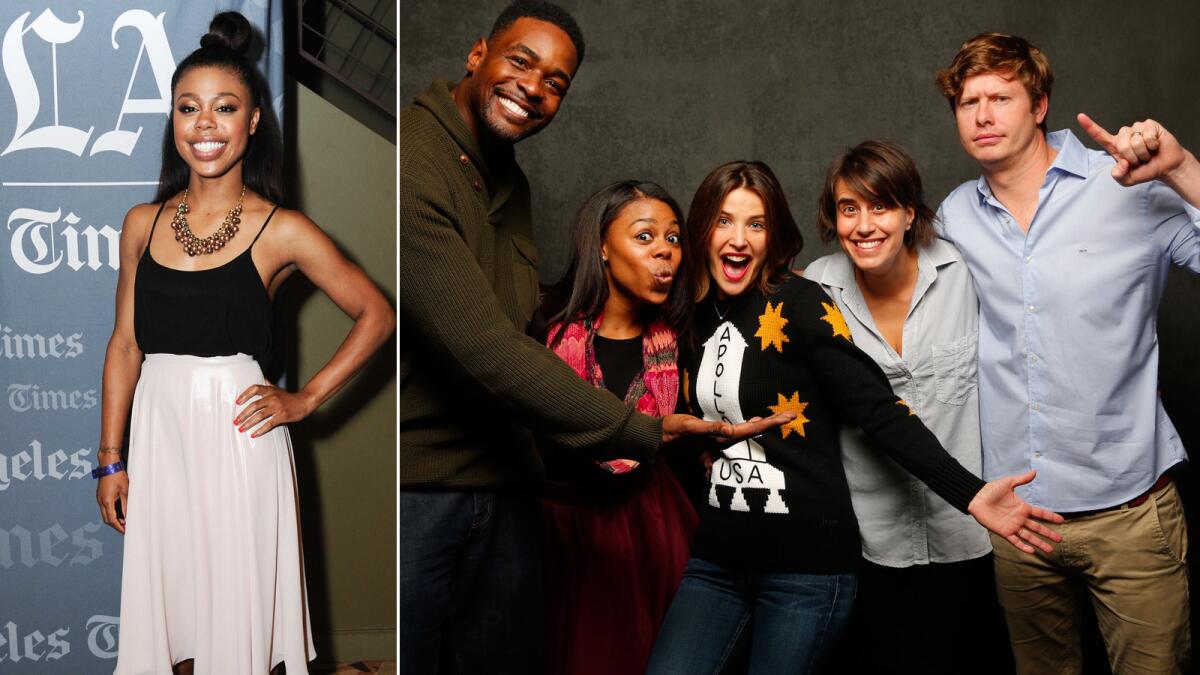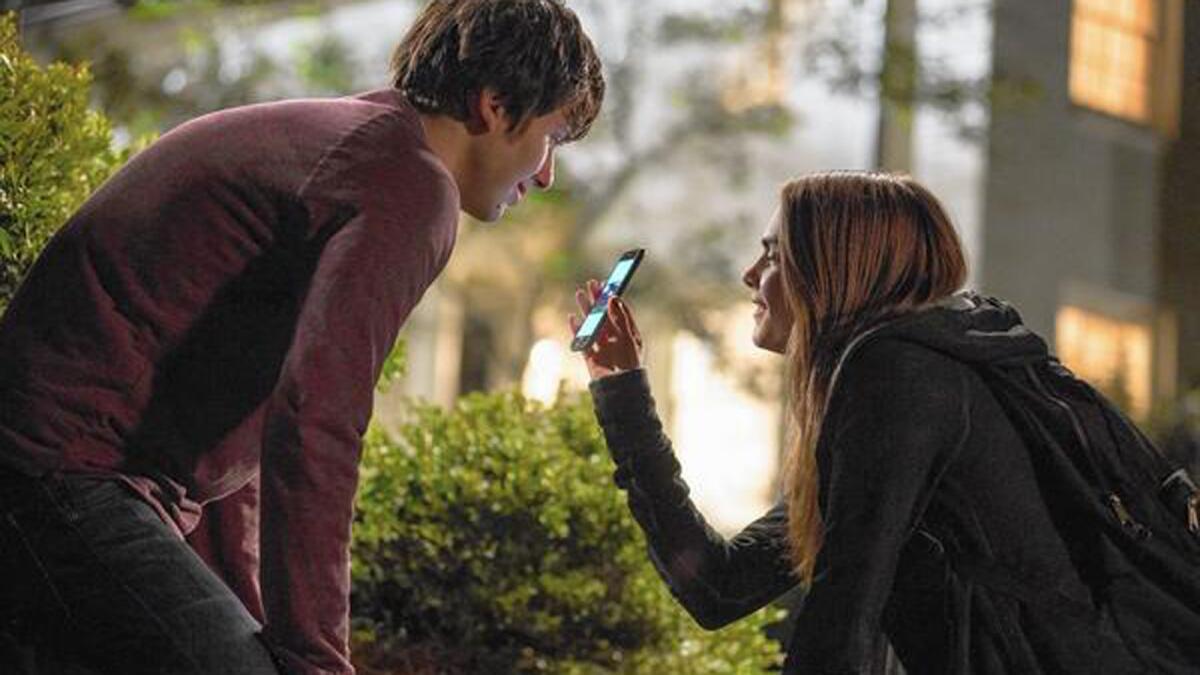Newsletter: Indie focus: Movies go to work, ‘Paper Towns,’ ‘The Passenger’ and our podcast
- Share via

Indie Focus logo for the newsletter
Hello! I’m Mark Olsen, and welcome to your weekly field guide to a world of Only Good Movies.
Last week we had an Indie Focus Screening Series event with the pregnancy dramedy “Unexpected.” Director Kris Swanberg couldn’t attend -- in an ironic twist not lost on her she is pregnant and unable to travel from her home in Chicago. So she sent along questions of her own for stars Cobie Smulders, Anders Holm and Gail Bean for our post-screening Q&A.
You can listen here in the second edition of our Indie Focus Podcast.

Left photo: “Unexpected” actress Gail Bean; right photo: executive producer Chris Webber with Bean and fellow “Unexpected” cast members Cobie Smulders, Kris Swanberg and Anders Holm.
Left: "Unexpected" actress Gail Bean. Right photo: Various people involved in "Unexpected.” (Richard Shotwell / Invision/AP; Jay L. Clendenin/Los Angeles Times)
This week we’ve got a screening and Q&A with “The Diary of a Teenage Girl” and writer-director Marielle Heller and actors Bel Powley and Alexander Skarsgard. (We hope to turn that into a future podcast too.)
August will mark three years that we’ve been putting on the screening series, and to celebrate we’ve gone a little nuts. (Also, there were just too many great movies and guests to turn down!) We’ve got “Fort Tilden,” “Mistress America,” “Digging For Fire,” “Grandma,” “Z For Zachariah” and “Learning To Drive” all on deck.
Check here for more info: events.latimes.com/indiefocus/
Nonstop movies. Movies nonstop.
Money, work and the movies

Kitana Kiki Rodriguez, right, in "Tangerine." (Magnolia Pictures)
I just wrote an essay on depictions of work in a handful of recent movies. Far too often in American movies, work life is reduced to some ill-defined environment from which long lunch breaks or afternoons off can be taken. How often have you left a film and wondered, “What exactly did they do at that office?”
And yet there are movies -- the recent “Magic Mike XXL,” “Tangerine” and “Results” come to mind -- that do place work at the forefront of their dramatic interest and intent.
In an interview earlier this year, “Results” writer-director Andrew Bujalski recalled how he went to see Robert Bresson’s 1983 film “L’Argent,” in part because the title translates simply as “Money.”
“I thought every movie should be called ‘L’Argent,’&rdquo Bujalski told me. “So much of our interactions in this culture and on this planet are driven by it. So it’s a part of every story, of course.”
'Paper Towns'

Nat Wolff is led on the best night of his life by Cara Delevingne in “Paper Towns.”
Nat Wolff is led on the best night of his life by Cara Delevingne in “Paper Towns.” (Michael Tackett / 20th Century Fox)
The new film “Paper Towns” is an adaptation of the novel by “The Fault in Our Stars” author John Green. Directed by Jake Schreier and adapted by Scott Neustadter and Michael H. Weber, who also wrote “The Spectacular Now,” the film is a teenage romance between characters played by Nate Wolff and Cara Delevinge.
In her review of the movie, Rebecca Keegan noted, “There's an old-fashioned chasteness to their banter — even about sex — that's charming in part because it's so rare in modern movies. It seems unlikely anybody's mom will get angry about ‘Paper Towns.’ Rarer still is a studio movie for young adults that concerns itself not with vampires or the apocalypse but with the mundane matters of the heart.”
This sentiment was echoed by the film’s director in a recent profile by Steve Zeitchik.
“We are the no-one-dies movie,” Schreier said, smiling as he made clear he's heard the question a few times before. “It is a little unfortunate no one turns into a vampire.”
Schreier’s previous feature, “Robot & Frank,” was in fact our very first Indie Focus Screening Series event. I also interviewed Schreier and wrote about the film then.
Parker Posey 'Close-Up'
The Film Society of Lincoln Center is one of the most venerable and venerated film organizations in the country. The organization puts on the New York Film Festival and the New Directors/New Films series (in conjunction with the Museum of Modern Art) and features important programming year-round of both repertory titles and new arthouse films.
A lot of fascinating people have passed through the society's doors over the years, and they recently started a podcast called “The Close-Up” to take advantage of that. A particularly wonderful conversation occurred recently between actress Parker Posey, currently onscreen in “Irrational Man,” and the FSLC’s deputy director, Eugene Hernandez. The pair talked about Woody Allen, Christopher Guest, Posey’s recent blond hair color and the importance of discovering the “temperature” of a film set. It’s a great listen.
'The Passenger'
Jack Nicholson and Maria Schneider in a scene from the movie "The Passenger." (Floriano Steiner / Sony Pictures Classics)
Michelangelo Antonioni is a filmmaker I feel I have grown into as I have grown older. I get his movies now in a way I simply didn’t before, their enigmas revealing themselves to me over time.
His staggering 1975 film “The Passenger,” starring Jack Nicholson and Maria Schneider in the story of a man trying to escape his life by assuming the identity of another, will be screening at the American Cinematheque at the Aero Theatre on July 30 on a double bill with Martin Scorsese’s likewise overwhelming “Taxi Driver.”
When “The Passenger” was rereleased in 2005, New York Times critic Manohla Dargis called it “arguably Antonioni’s greatest film” while adding that “it dazzles from first shot to last.”
When the film was originally released in 1975, the Los Angeles Times’ own Kevin Thomas interviewed Antonioni in Los Angeles, “in the Jose Ferrer Suite in the Beverly Wilshire’s new wing.”
As to whether he favored style over substance and mystery over meaning, Antonioni countered by saying, “If it looks fantastic then there is something in it that is fantastic!”
Antonioni added, “Words are symbols, images are what they are. I may be someone who is successful -- I don’t know, perhaps -- with something to show, not something to say. I can’t find the right words. I’m not a writer.”
Email me if you have questions, comments or suggestions, and follow me on Twitter @IndieFocus.
Only good movies
Get the Indie Focus newsletter, Mark Olsen's weekly guide to the world of cinema.
You may occasionally receive promotional content from the Los Angeles Times.







